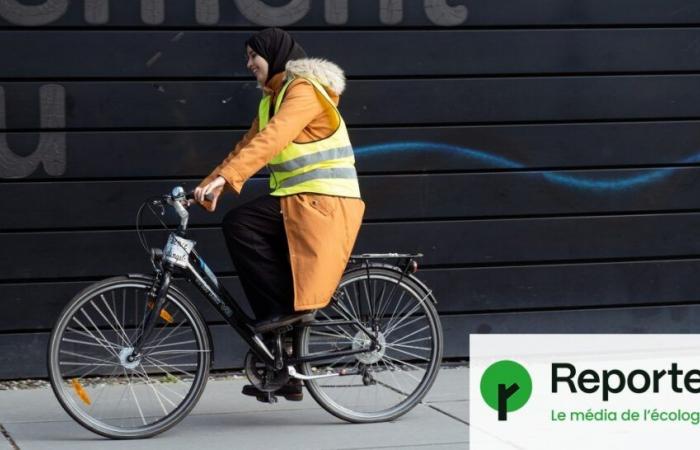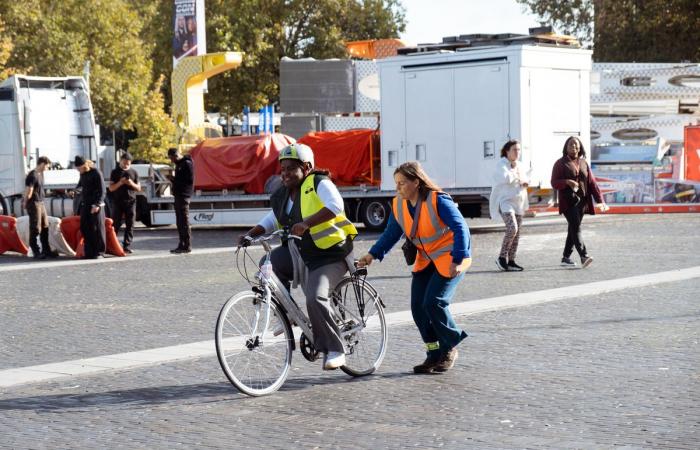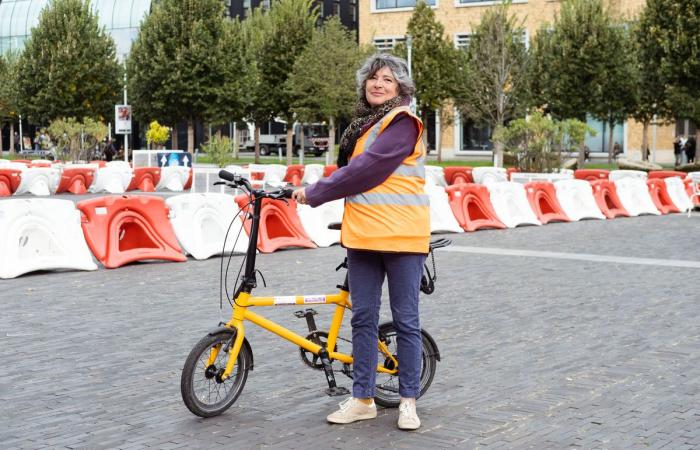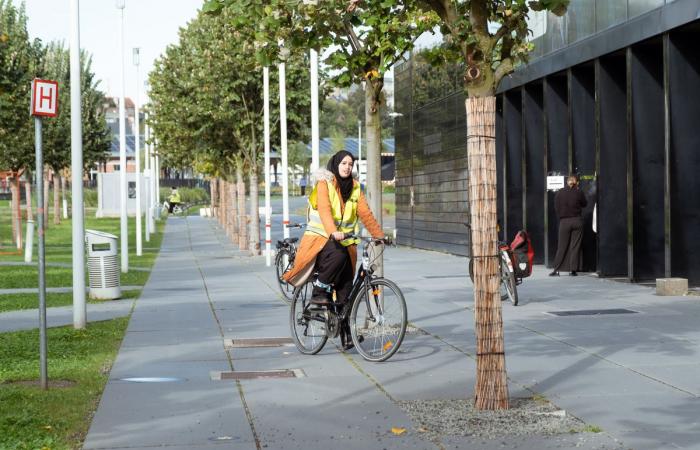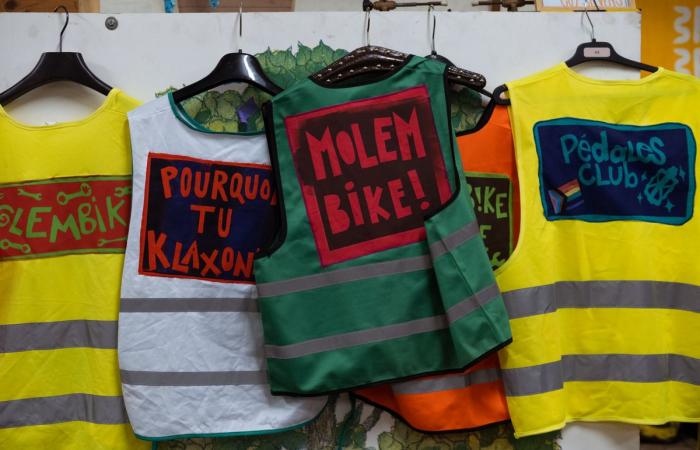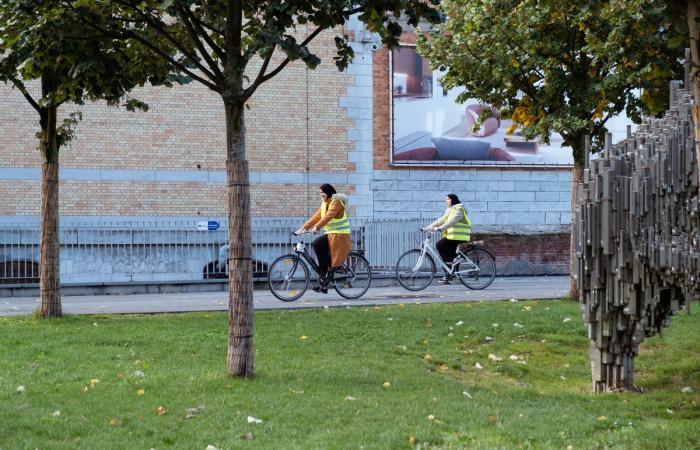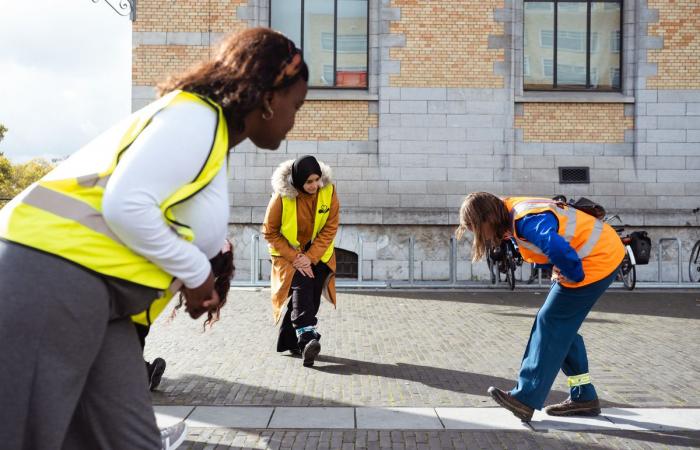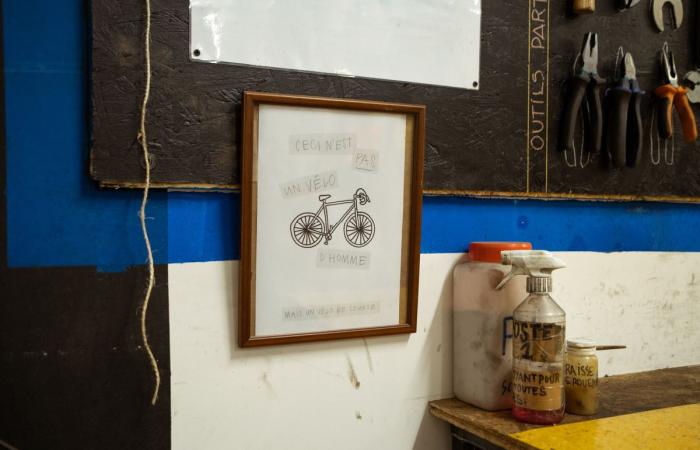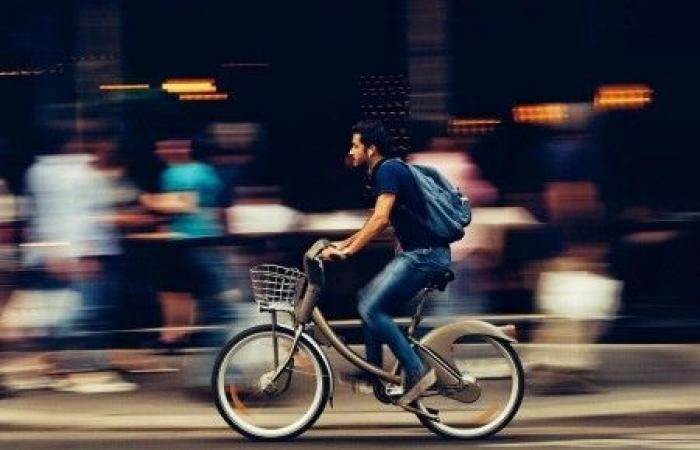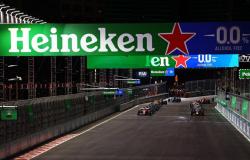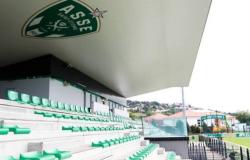Molenbeek, Brussels (Belgium), report
One October morning, along the Brussels canal, the thick clouds occasionally let in a few rays of sunlight which caress the red bricks of Tour & Taxis, a former converted industrial site. Underground, in an old cellar where goods were once stored, the smell of new rubber hangs in the air. The Molembike workshop, filled with bikes of all sizes, shelves overflowing with tools, spare parts and stripped-down frames, comes to life.
Eight women put on their fluorescent yellow vests, ready to get into the saddle with Hirond'Elles, a project launched in 2016 to give the women of Molenbeek the means to ride and conquer public space. And not just any way: here, each bike bears the name of an inspiring woman, from Bell Hooks to Fatima Mernissi, figures of resistance and emancipation.
Carine, on the left, who is starting cycling, with Delphine, project manager, in the Molembike premises.
© Jeanne Fourneau / Reporterre
For many participants, getting into the saddle is not easy. In Brussels, where cycling is trying to find a place, only 40 % of cyclists are women. « Many did not have the opportunity to learn to pedal small, often for cultural or economic reasons »explains Delphine Metten, 47, project manager. « Girls are less encouraged to take these risks. » She herself was not born on a bike and knows what it's like to have to tame the road.
« My parents couldn't afford to buy me a bike. »
Once the settings have been made, their helmets are securely clipped, the participants advance onto a vast esplanade, framed by brick and glass buildings. Carine, 44, a civil servant and mother of three children, timidly puts one foot on her bike. For her, it's a big challenge. After spending her childhood in Congo, she arrived in Belgium at the age of eight. « My parents couldn't afford to buy me a bike. »she confides.
Later, as a teenager, an unfortunate fall and a scar were enough to reinforce his aversion to cycling. « If I break my face, no photos, eh ! » she jokes before launching herself, trying to keep her balance by beating the ground with her legs to move forward. But this time, his determination is clear: « While cars and buses get stuck in traffic jams, we can see that bikes are moving forward ! » And then, she already imagines long bike rides with her children, far from the tumult of the traffic.
Delphine balances Carine as she tries to start pedaling on the Belgian cobblestones.
© Jeanne Fourneau / Reporterre
Isa, a purple fleece volunteer, pedals alongside him on her folding bike. « Look far ahead, and don't grip the handlebars too much »she advises in a reassuring tone. Isa, 62, also learned to ride late in life. « When my husband started cycling when he arrived in Brussels in 1989, I thought he was crazy ! I already saw myself as a widow »she remembers while rolling her « r » with his half-Portuguese, half-Belgian accent.
Today, Isa explores the city by bike without hesitation and guides others with contagious kindness. « The magic of first times is what I like most here. When a woman finally pedals alone, I jump for joy even higher than her »she enthuses. Her light, dance-like step – bust back, legs forward and hands swinging – reflects this new freedom that she helps to instill in others.
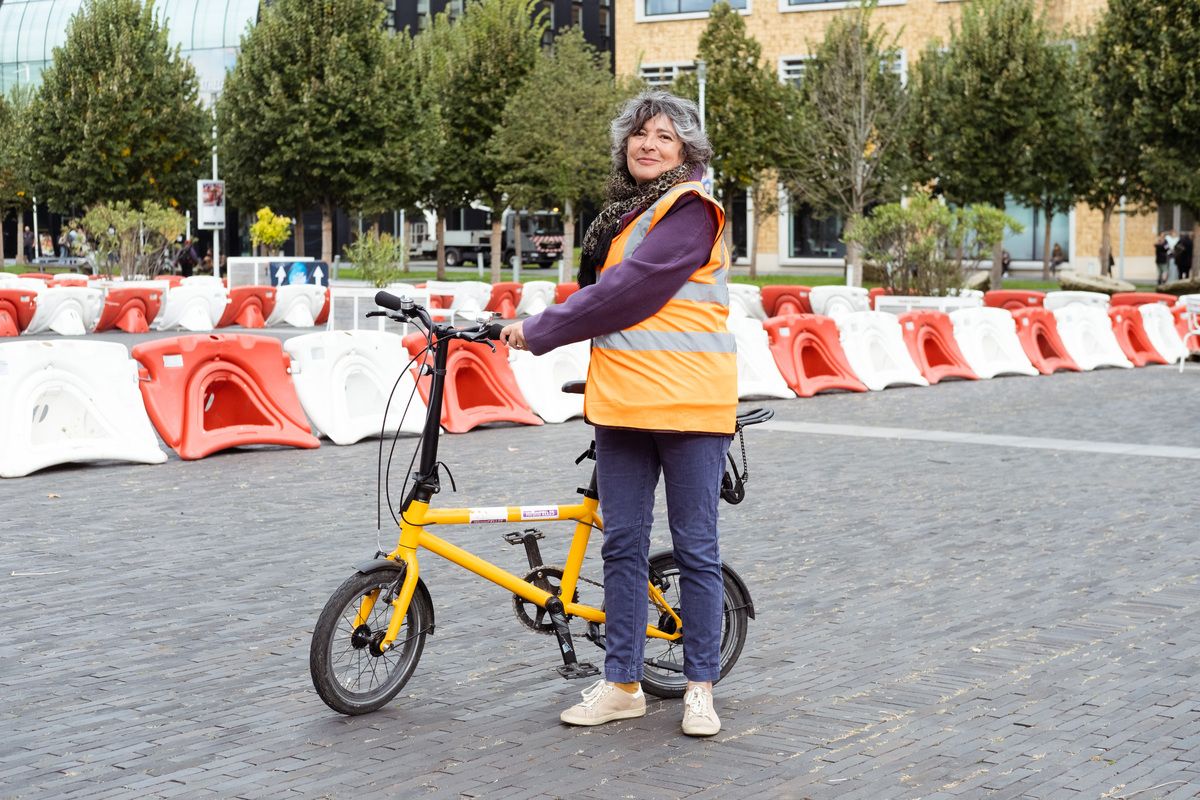
Isa, 62, travels the streets with her folding bike, and encourages other women to get involved too.
© Jeanne Fourneau / Reporterre
A little further away, Laïla, 34, is more confident on her bicycle. However, her fear of cars still paralyzes her: « My husband always says I don't know how to drive, but that's mostly because cars give us so little room. » Laïla discovered the project thanks to her friend Khadidja, with whom she teaches Arabic to children.
« You sway a little when starting »
For her, the bike represents a godsend for her daily travels: « I would like to swap public transport for cycling, to be able to move around freely with my two children »she confides. « You sway a little when starting and you still stop too suddenly, but it will come »encourages Delphine. And little by little, Laïla stands up on her bike.

Laïla drives better and better, but still fears cars “ which leave us so little room ».
© Jeanne Fourneau / Reporterre
The group becomes an essential support for these apprentice cyclists. The most advanced, like Renilde, 60, who travels 8 kilometers to get to the workshop, serve as models. « It’s the energy of the group that carries them »observe Delphine.
It is together that they overcome their fears, that they learn to ride and that they dare to face the road. But it's a fragile balance: they must gain enough confidence to one day ride alone, without the support of the collective. « The goal, in the end, is that they can become daily cyclists. »

The collective is there to encourage the use of bicycles throughout the year.
© Jeanne Fourneau / Reporterre
In Renilde's wheel, Lahouarie, 54, does not hide his ambition. After only three sessions, even if she still zigzags a lot, she already sees herself walking the streets. « I had wanted to learn for years, but there were always obstacles: children, lack of time »she said. « We women stay at home too often »acquiesce Laïla.
Hélène, 33, talks about her different journey. Living in Charleroi in the 90s, her mother, frightened by the Dutroux affair, never let her go out. « I love these classes. I feel more and more comfortable »she smiles despite a minor fall. After several months of learning, she is soon thinking of taking the plunge and going to work by bike.

The two friends Laïla and Khadidja learn to ride a bike together thanks to Hirond'Elles.
© Jeanne Fourneau / Reporterre
Hirond'Elles seeks to remove all obstacles. For 20 euros per year, women and their children can participate in sessions and borrow bicycles. Hours are adapted to accommodate as many people as possible.
« It's also about social justice »
But if these women manage to overcome their fears, other sneaky obstacles still arise. The lack of cycle paths, the density of car traffic, and even the narrowness of housing in Molenbeek where storing your bike becomes a headache.
« Many have progressed, but their bike remains stuck on a balcony, even if they are lucky enough to have one. »she laments. Delphine would therefore like public policies to go further: « We could do more to encourage female cycling. It is also about social justice. »

Today's workout ends with a good stretching session.
© Jeanne Fourneau / Reporterre
For Brussels Mobility — the administration of the Brussels-Capital region responsible for equipment, infrastructure and travel —, contacted by Reporterrethe Hirond'Elles project represents an initiative « important and priority » to compensate for the « underrepresentation of poorly educated women among cyclists in the region ». It supports it, in 2024, with a subsidy of 80,000 euros.
Lagging infrastructure
The administration recognizes that « the lack of secure infrastructure remains the main obstacle for all cyclists, particularly in working-class neighborhoods where car pressure is strong ». To remedy this, several development projects are underway, such as the redevelopment of Square Sainctelette, a place feared by cyclists in Molenbeek, as well as studies to secure Boulevard Léopold II and Avenue du Port.
In addition, Brussels Mobility claims to be focusing on a reduction in motorized traffic in certain neighborhoods and the development of secure parking for bicycles via neighborhood car parks and boxes installed in response to local needs.

The city still lacks a lot of infrastructure to accommodate bicycles, but for these women, learning to ride one is already a big step towards a brighter horizon.
© Jeanne Fourneau / Reporterre
After two hours of effort, the sun bathes the esplanade in a gentle warmth. It's time for stretching, a moment of shared relaxation where laughter bursts out. Some wobble while trying to stand on one leg. « It's like cycling, you have to try again and again »smiles Carine, ready to come back for the next session.
For some, the adventure doesn't end there. Hirond'Elles also offers outings throughout Brussels and beyond. « We went to the sea, to Ostend, and to a nature reserve near Antwerp »says Delphine. Driving then becomes an escape, far from densely populated and polluted neighborhoods, invaded by motorized vehicles. « Without the group, I would never have dared »admits a grateful participant.

